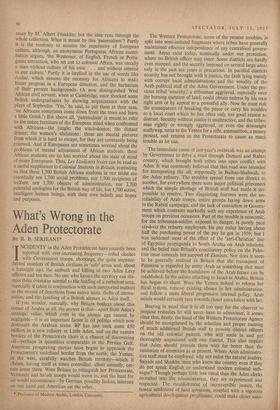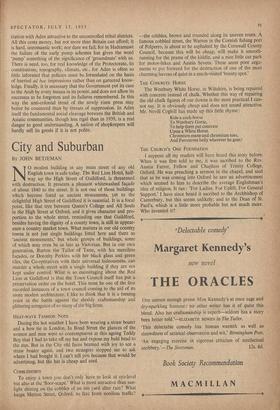What's Wrong in the Aden Protectorate
BY R. B. SERJEANT*
i
4 NCIDENTS' in the Aden Protectorate have recently been reported with ever-increasing frequency—tribal clashes with Government troops, shootings, the quite unprece- deined murders of British civilians in 'safe' areas and, about a fortnight ago, the ambush and killing of two Aden Levy officers and ten men. No one who knows the territory can dis- miss these events as normal to the holding of a turbulent area, especially if taken in conjunction with such unreported matters as the stream of desertions from native units, thefts of ammu- nition, and the lynching of a British airman in Aden itself.
If you wonder, naturally, why Britain bothers about this corner of Arabia at all, the answer is that—apart from Aden's strategic value, which even in the, atomic age cannot be negligible—it is an important factor in oil politics which now dominate the Arabian scene. BP has just sunk some £50 million in a new refinery at Little Aden, and on the eastern borders of the Protectorate there is a chance of discovering oil--perhaps in quantities comparable to the Persian Gulf. American prospecting parties have begun to approach the Protectorate's undefined border from the north; the Yemen, in the west, carefully watches British territory—which it claims, having itself at times controlled, albeit uneasily, cer- tain areas there. Were Britain to relinquish her Protectorate, Yemenite and Sa'udi troops would move in, and the hunt for oil would recommence—by German, possibly Italian, interests on one hand and American on the other.
Professor of Modern Arabic, London University.
The Western Protectorate, scene of the present troubles, is split into semi-isolated fragments where tribes have generally maintained effective independence of any centralised govern- ment. Areas exist today, nominally under our protection, where no British officer may enter. Some districts are hardly even mapped, and the security imposed on several large areas only in the past ten years is precarious. In pacified districts security has not brought with it justice, the fault lying mainly with corrupt local administrations and the venality of the Arab political staff of the Aden Government. Under the pre- vious tribal 'anarchy,' a tribesman aggrieved, especially over the burning question of land, could obtain redress by his own right arm or by appeal to a powerful ally. Now he must risk the consequence of breaking the peace or carry his troubles to a local court which he has often only too good reason to distrust. Security without justice is unattractive, and the tribes- man rightly or wrongly aggrieved, or even the downright scallywag, turns to the Yemen for a rifle, ammunition, a money present, and returns to the Protectorate to cause as much trouble as he can.
The immediate cause of last-year's outbreak was an attempt by Government to drive a road through Damani and Rabizi country, which brought both tribes into open conflict with Aden. It was commonly believed that this road was intended for transporting the oil, supposedly in Baihan-Shabwah, to the Aden refinery. The troubles spread from one district to another, for everywhere there were major political grievances which the simple shortage of British stall had made it im- possible to resolve. Two disquieting features were the un- reliability of Arab troops, entire groups laying down arms in the Rabizi campaign, and the lack of conviction in Govern- ment which contrasts markedly with my experience of Arab troops on previous occasions. Part of the trouble is economic, for the tribesman-soldier, exposed to danger, is poorly paid vis-a-vis the refinery employees, his pay today having about half the purchasing power of the pay he got in 1939; but 1 was saddened most at the effect of the 'anti-Christian' line of Egyptian propaganda to South Arabia on Arab relations, and the belief that Britain's conciliatory policy on the Pales- tine issue conceals her support of Zionism. Nor does it seem to be generally realised in Britain that the reconquest of Palestine is regarded by every Arab as something that must be achieved before the foundation of the Arab future can he established. In the odium attaching to Israel in Arabia, Britain has begun to share. Were the Yemen indeed to reform her fiscal system, remove existing abuses in her administration. and follow a more liberal progressive internal policy, Arab minds would certainly turn towards closer association with her.
Bearing in mind that it is all too easy for the observer to propose remedies he will never have to administer, it seems clear that, firstly, the hand of the Western Protectorate Agency should be strengthened by the selection and proper training of much additional British staff to provide district officers on the old colonial pattern, who will' settle in and get thoroughly acquainted' with one district. This also implies that Aden should provide them with far better than the minimum of amenities as at present. Where Arab administra- tive staff must be employed, why not enlist the natural leaders, Saiyids and .Shaildis,'men who know the country even if they do not speak English or understand modern colonial tech- nique? Though perhaps little less venal than the Aden clerks recruited into the administration, they are experienced and respected. The establishment of incorruptible justice, the, honest settlement of land questions, coupled with a vigorous agricultural development programme, could rnake closer asso- ciation with Aden attractive to the uncontrolled tribal districts. All this costs money, but not more than Britain can afford; it is hard, unromantic work; nor dare we fail, for in Hadramawt the failure of the early pump schemes has given the word `pump' something of the significance of 'groundnuts' with us. There is need, too, for real knowledge of the Protectorate, its constitutions, topography, climate. etc.. for Aden is, often so little informed that policies must be formulated on the basis of hurried ad hoc impressions rather than on garnered know- ledge. Finally, it is necessary that the Government put its case to the Arab by every means in its power, and does not allow its successes to be forgotten and its failures remembered. In this way the anti-colonial trend of the newly risen press may better be countered than by threats of suppression. In Aden itself the fundamental social cleavage between the British and Asiatic communities, though less rigid than in 1939, is a real danger to good understanding. A nation of shopkeepers will hardly sell its goods if it is not polite.



































 Previous page
Previous page